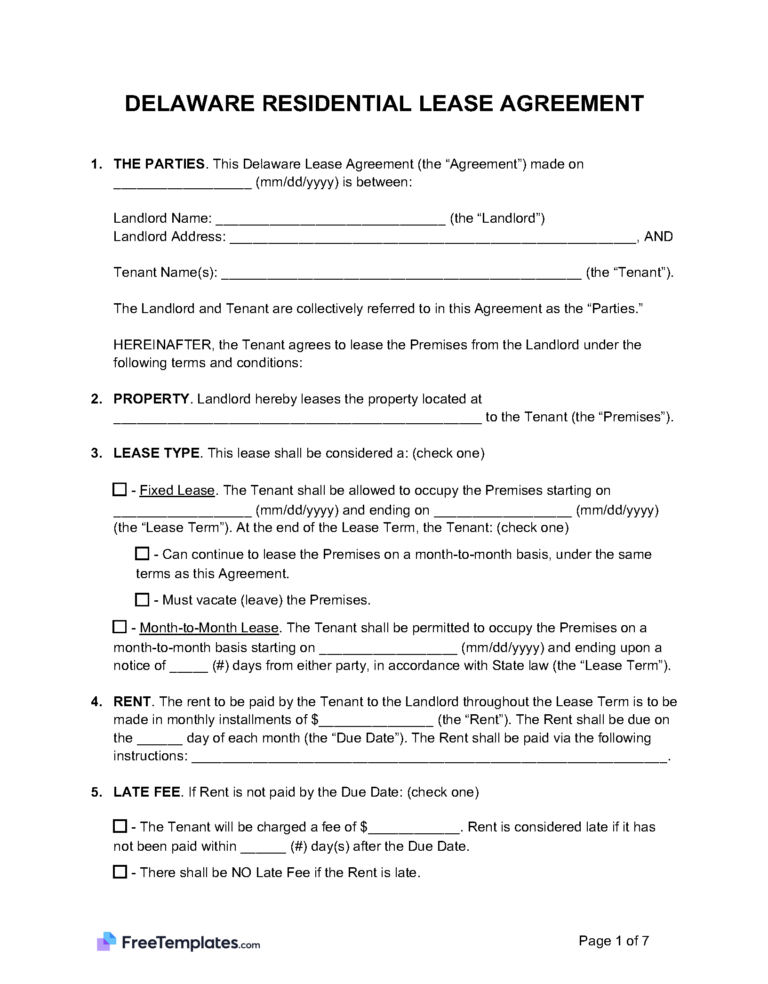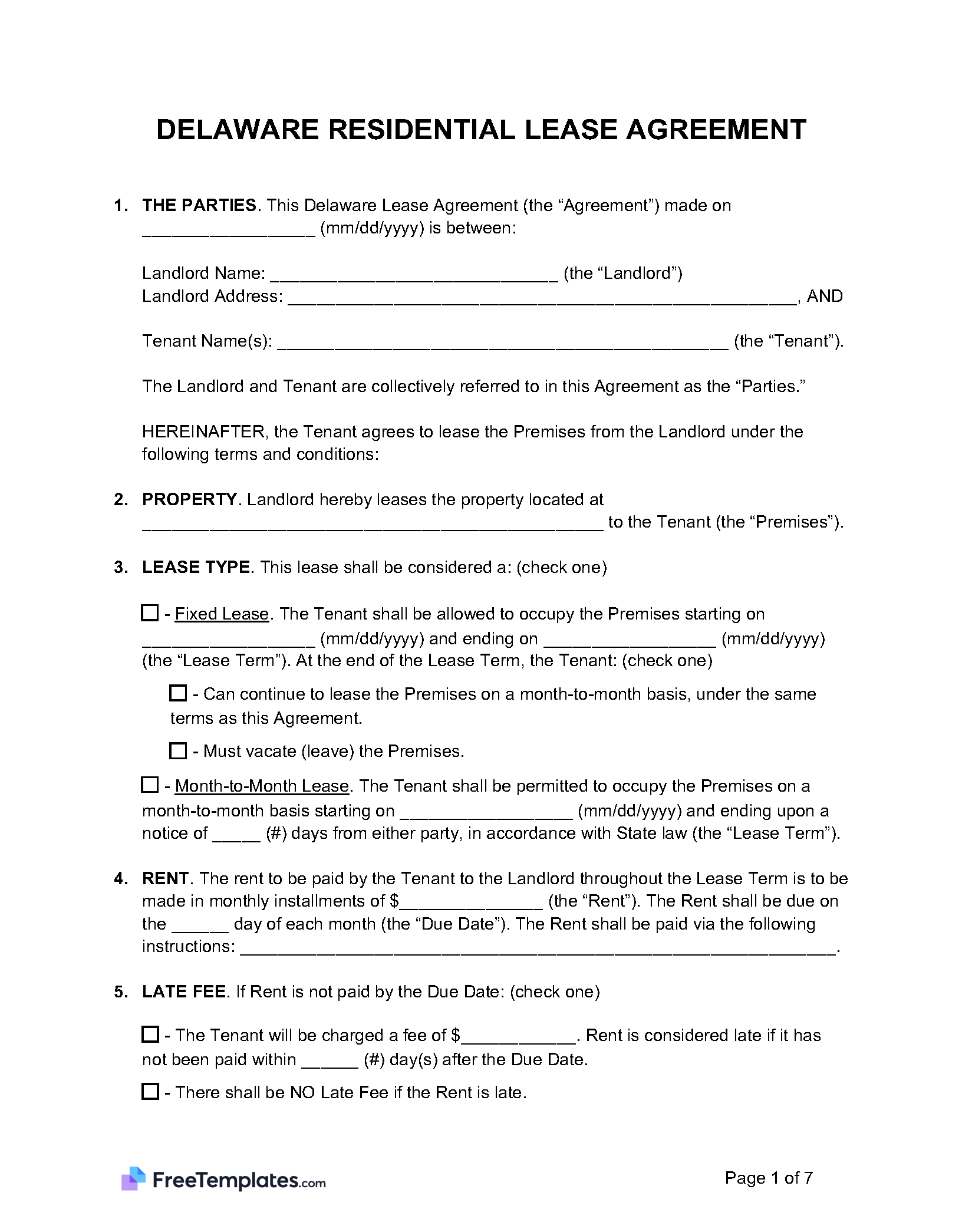By Type (6)
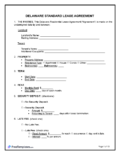 Standard Lease Agreement – A legally binding contract that sets the specifications for renting a residential property in Delaware. Standard Lease Agreement – A legally binding contract that sets the specifications for renting a residential property in Delaware.Download: PDF, MS Word, ODT |
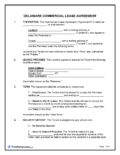 Commercial Lease Agreement – A legal document establishing the terms and conditions for renting a property for business in Delaware. Commercial Lease Agreement – A legal document establishing the terms and conditions for renting a property for business in Delaware.Download: PDF, MS Word, ODT |
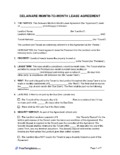 Month-to-Month Lease Agreement – A rental arrangement that allows a tenant to rent a property monthly. The tenant or the landlord can terminate the contract with proper notice, typically 30 days. Month-to-Month Lease Agreement – A rental arrangement that allows a tenant to rent a property monthly. The tenant or the landlord can terminate the contract with proper notice, typically 30 days.Download: PDF, MS Word, ODT |
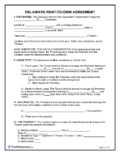 Rent-to-Own Agreement – A contract in which a tenant agrees to rent a property for a specified period of time before having to purchase it at a pre-agreed-upon price. Rent-to-Own Agreement – A contract in which a tenant agrees to rent a property for a specified period of time before having to purchase it at a pre-agreed-upon price.Download: PDF, MS Word, ODT |
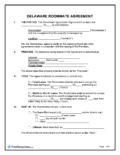 Roommate Agreement – A legal arrangement between individuals living in the same property. It outlines responsibilities between the parties and is in addition to a formal lease between the tenants and the landlord. Roommate Agreement – A legal arrangement between individuals living in the same property. It outlines responsibilities between the parties and is in addition to a formal lease between the tenants and the landlord.Download: PDF, MS Word, ODT |
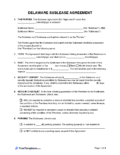 Sublease Agreement – A contract in which the original tenant (sublessor) rents out all or part of the rental property to a new tenant (sublessee) for a specified period. During this time, the original tenant remains responsible for the lease agreement. The tenant does need permission to sublet. Sublease Agreement – A contract in which the original tenant (sublessor) rents out all or part of the rental property to a new tenant (sublessee) for a specified period. During this time, the original tenant remains responsible for the lease agreement. The tenant does need permission to sublet.Download: PDF, MS Word, ODT |
Disclosures (3)
Landlord’s Contact Details – The lease must include the property manager’s or landlord’s name and address, as well as the contact information for maintenance requests and emergencies. (§ 5105)
Landlord-Tenant Laws – The landlord must give the tenant a copy of the Summary of the Landlord-Tenant Code when they sign the rental agreement. (§ 5118)
Lead-Based Paint Disclosure – If the rental property was built before 1978, Landlords must disclose known information about lead-based paint dangers. They must also provide the tenant with a lead paint hazard pamphlet and include specific language in the lease agreement regarding lead-based paint.
Security Deposit
Maximum Amount – If the lease is for a year or longer, the landlord cannot ask for a security deposit that is more than 1 month’s rent. For month-to-month leases or leases without a defined end date that have lasted for a year or more, the security deposit cannot exceed 1 month’s rent. If the tenancy lasts over a year, the landlord must promptly return any security deposit amount that exceeds 1 month’s rent. These rules do not apply to furnished rental units. (§ 5514(a))
Interest on Security Deposit – The landlord must deposit the security payment in a state-accepted financial institution and disclose to the tenant where the security deposit is held within 20 days of the written request. If they fail to do so, they will lose the deposit to the tenant. If the landlord does not return the full deposit within 20 days of the request, the tenant can get double the amount back. (§ 5514(b))
Returning to Tenant – The landlord has 20 days of the rental agreement ending to return the full security deposit to the tenant. If the tenant is not entitled to the total deposit, the landlord has 20 days of the lease’s termination to provide a detailed list of damages and estimated repair costs. If the landlord fails to provide a list within 20 days, they acknowledge that the tenant owes nothing for damages. Should the tenant disagree with the amount withheld, they must object in writing within 10 days. (§ 5514(e))
Landlord Access
General Access – To protect the privacy of the tenant, landlords must provide at least 2 days’ notice before entering the property for non-emergency reasons. Delaware law specifies that the entry must be made between 8:00 a.m. and 9:00 p.m., except for repairs requested by the tenant. A tenant can waive the 48-hour notice requirement for entrance, but only for prospective tenants or buyers. This waiver must be in writing and signed by the tenant. (§ 5509(B))
Emergency Access – In case of emergency, the landlord or property manager can enter the rental unit without notice. (§ 5509(B))
Paying Rent
Grace Period – Delaware has no statutory forgiveness period for paying rent. Rent is typically due on the date specified in the lease agreement.
Maximum Late Fee – Delaware does not regulate the maximum amount a landlord can charge for late rent. However, the fee must be reasonable and disclosed in the lease agreement.
Returned Checks (NSF) – The landlord can charge a returned check fee if a tenant’s check bounces. Delaware law allows landlords to charge up to $40 or 5% of the check’s amount, whichever is greater. (§ 1301A)
Reasons for Eviction (3)
Non-Payment of Rent – If the tenant fails to pay rent, the landlord must provide a 5-day notice to pay rent or quit before filing for eviction. (§ 5502(A))
Non-Compliance – If the tenant violates any lease agreement terms, such as causing damage to the property or engaging in illegal activity on or around the rental property, the landlord must provide a 7-day notice to remedy the violation or quit before filing for eviction. (§ 5513(A))
Illegal Activity – If the tenant’s actions cause serious harm to people or property or the tenant is convicted of a serious crime during their tenancy, the landlord can take eviction action without notice. The landlord can either fix the problem and charge the tenant, end the lease right away with notice, or do both. (§ 5513(B))
